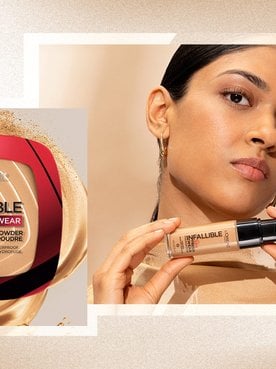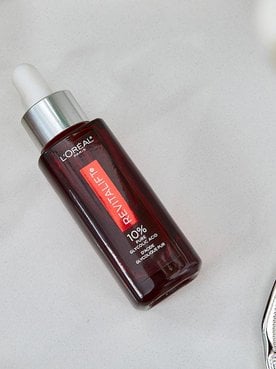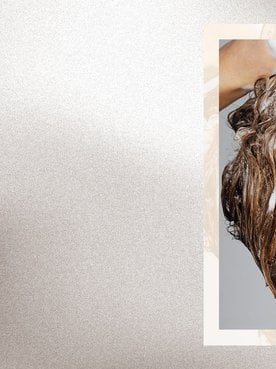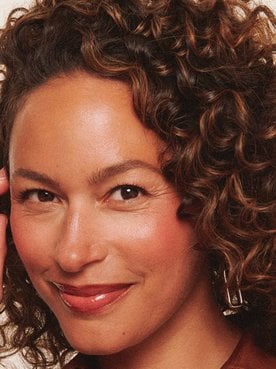In this article
- Retinol and the Science of Skin Renewal
- Understanding How Retinol Works On Skin
- The Visible Benefits of Retinol for Smoother, Brighter Skin
- How To Use a Retinol Serum Step by Step
- Morning or Evening? When to Apply Retinol
- Retinol Serum vs Retinol Cream: Understanding the Difference
- How To Layer Retinol With Other Active Ingredients
- Can You Use Retinol Every Day?
- Challenges and Solutions: Possible Side Effects of Retinol and How to Manage Them
- How Long Does Retinol Take to Show Results?
- Common Retinol Mistakes That Can Slow Your Progress
- Who Benefits Most from Retinol?
- Frequently Asked Questions
- L'Oréal Paris Retinol Products: Selecting Your Formula
If fine lines, uneven tone, or dullness have you rethinking your routine, retinol serum is one of the most trusted ways to help your skin look smoother and brighter. This potent derivative of vitamin A supports your skin’s natural renewal process over time to improve the appearance of skin texture and tone.
Many professionals advise applying a pea-sized amount to clean, dry skin at night for optimal results. A common approach is to follow with a nourishing moisturizer to seal in hydration, paired with a broad-spectrum SPF 30+ sunscreen in the morning to help protect the skin’s renewed surface.

Retinol and the Science of Skin Renewal
Retinol is a naturally occurring form of vitamin A already found within the body. This makes it a uniquely bio-compatible asset that works in harmony with your skin’s existing biology to support youthful, healthy-looking skin. While the term “retinoid” serves as the umbrella category for both prescription-strength treatments and over-the-counter options, retinol is distinct because it is generally gentler and available without a prescription.
When applied topically, retinol is converted to retinoic acid in the skin's surface layers. This makes it an accessible, effective choice for anyone looking to address common skin concerns without the potential irritation often associated with prescription-strength retinoic acid. Whether you are curious about what retinol is used for or you’re looking to add a powerful active to your routine, understanding this distinction is the first step toward a radiant complexion.
Understanding How Retinol Works On Skin
Understanding how this active supports the skin starts with its ability to assist the natural renewal process. Once absorbed, retinol helps stimulate surface cell turnover, encouraging the shedding of dead skin cells to reveal fresher, brighter skin underneath.
Simultaneously, retinol helps support the skin's natural collagen production. As the structural protein that keeps the skin looking firm and plump, collagen is essential for a resilient appearance. By helping maintain these levels, retinol helps smooth the appearance of fine lines and improve overall skin elasticity over time.
The Visible Benefits of Retinol for Smoother, Brighter Skin
The list of retinol serum benefits is extensive, making it one of the most versatile ingredients in modern skincare. Whether you are looking to refine texture or address signs of aging, here are the top reasons why retinol is good for skin:
- Smooths the appearance of fine lines and wrinkles: Retinol is widely celebrated for its ability to help reduce the look of crow's feet, forehead lines, and deep wrinkles by supporting skin structure.
- Improves uneven skin tone: By accelerating cell turnover, retinol helps fade the appearance of dark spots and sun damage, leading to a more uniform complexion.
- Refines skin texture: Regular use of retinol serum helps smooth rough patches, leaving skin feeling softer and looking more polished.
- Helps clear breakouts: Retinol helps prevent dead skin cells from clogging pores, reducing the frequency of blemishes and acne.
- Boosts radiance and brightness: The exfoliation process instigated by retinol reveals new skin cells, replacing dullness with a healthy, lit-from-within glow.
- Enhances skin firmness: By supporting collagen, retinol helps skin appear tauter and more resilient.
- Minimizes the look of large pores: By keeping pores clear of debris and supporting skin elasticity, retinol can make pores appear smaller and tighter.
- Provides antioxidant protection: Vitamin A acts as an antioxidant, helping to neutralize free radicals on the skin's surface that contribute to premature aging.
- Addressing the signs of photoaging: Clinical research, including studies published in the Journal of Drugs in Dermatology, highlights retinol as a premier asset for correcting photoaging. By utilizing advanced delivery systems, retinol specifically targets the structural damage caused by UV exposure, such as leathery texture and deep-set wrinkles.

How To Use a Retinol Serum Step by Step
Knowing how to apply retinol serum correctly is essential to ensuring a comfortable and effective experience. Following a structured protocol helps maximize the visible benefits while maintaining the skin's moisture barrier.
- Cleanse thoroughly: Start with a gentle cleanser to remove makeup and impurities, ensuring the skin is prepared to receive the active ingredients.
- Dry the skin completely: It is recommended to wait a few minutes after washing. Applying retinol to damp skin can increase absorption too quickly, potentially leading to sensitivity.
- Apply retinol serum: Dispense a pea-sized amount of a formula, such as the L'Oréal Paris RevitaLift Derm Intensives Night Serum, 0.3% Pure Retinol, onto the fingertips. Gently smooth it over your face, avoiding the immediate eye area and lips.
- Moisturize: Once the serum has absorbed (allow about two minutes), apply a nourishing moisturizer to lock in hydration and support the natural renewal process.
- Sun protection (morning): Retinol can increase your sensitivity to the sun, so you must always use a broad-spectrum sunscreen the next morning.
Editor’s tip: For those with sensitive skin or those new to the ingredient, many professionals turn to the "sandwich method." This involves applying a thin layer of moisturizer before your retinol, then applying the retinol, and finishing with a second layer of moisturizer. This technique buffers the active ingredient without compromising its efficacy.

Shop the Product
Morning or Evening? When to Apply Retinol
Retinol is a powerful active that is most effective when integrated into a nightly ritual. Because the ingredient is light-sensitive and can increase the skin's sensitivity to the sun, it should be reserved for evening use. Below is a professional guide for structuring a balanced AM and PM regimen.
| Step | Morning | Evening | Notes |
| 1 | Gentle cleanser | Gentle cleanser | Use a non-stripping, hydrating formula |
| 2 | Vitamin C serum | Wait for skin to dry (1 to 2 min) | Retinol is best applied to dry skin to manage absorption levels |
| 3 | Moisturizer | Retinol serum | Start retinol 1 to 2x per week with a pea-sized amount, building to nightly use |
| 4 | SPF 30+ sunscreen (mandatory) | Wait 1 to 2 minutes for absorption | Let retinol settle before next step |
| 5 | Makeup (optional) | Moisturizer | Seals in hydration, buffers retinol |
| 6 | — | Eye cream (optional) | Apply eye cream last to ensure the active stays away from the delicate eye area |
Retinol Serum vs Retinol Cream: Understanding the Difference
When choosing between a retinol serum and a retinol cream, the decision often rests on your skin type and how you prefer to layer your daily ritual. Both forms offer the transformative benefits of vitamin A, but their textures serve different roles in your protocol.
- Retinol serum: Serums are typically lightweight, potent, and fast-absorbing. Because of their fluid texture, they are an ideal asset for those with oily or combination skin, or for anyone who enjoys the process of layering a separate, heavier moisturizer on top. A serum is designed to deliver a high concentration of active ingredients efficiently. For those looking to integrate a high-performance serum into their evening protocol, a premier choice is the L'Oréal Paris RevitaLift Derm Intensives Night Serum, 0.3% Pure Retinol.
- Retinol Cream: Creams combine retinol with moisturizing bases, such as ceramides or oils. These formulations are excellent for dry or sensitive skin types that need immediate hydration alongside the active ingredient. A cream, such as the L'Oréal Paris RevitaLift Triple Power Anti-Aging Moisturizer, Fragrance-Free (pictured below), offers the benefits of pro-retinol in a comforting texture.

Shop the Products
How To Layer Retinol With Other Active Ingredients
One of the most notable benefits of a retinol ritual is its ability to clear the path for the rest of your routine. By accelerating the removal of dead surface cells, it allows your other antioxidants and moisturizers to penetrate more effectively, ensuring your entire morning and evening ritual is high-performance.
However, to truly unlock this potential, one must navigate the delicate balance of ingredient compatibility. Understanding which ingredients complement retinol and which are best reserved for separate moments will help you maintain a resilient and balanced complexion.
| Ingredient | Compatibility | Notes |
| Niacinamide | Safe | These are an ideal pairing. Niacinamide helps soothe and strengthen the skin barrier, complementing retinol. The L'Oréal Paris Revitalift Pressed Night Moisturizer with Retinol + Niacinamide combines both. |
| Vitamin C | Separate | To maximize efficacy and avoid sensitivity, reserve vitamin C for your morning routine and retinol for evening renewal. |
| Hyaluronic Acid | Safe | This hydration hero is safe to layer before or after retinol to boost moisture levels. This is a foundational pairing for those focused on a plump, bouncy skin quality. |
| AHAs/BHAs (Glycolic/Salicylic) | Separate | Using glycolic or salicylic acids in the same session may lead to overexfoliation. Many professionals recommend skin cycling, alternating these actives on different nights. |
| Benzoyl Peroxide | Avoid | This ingredient can affect retinol's stability. It is best used on alternate evenings or as part of a separate morning routine. |
| Moisturizer | Essential | Always follow retinol with a nourishing moisturizer. Try the sandwich method for extra protection against dryness. |
| SPF | Mandatory | Mandatory every morning when using retinol. Retinol increases sun sensitivity. Use SPF 30 or higher. |
| Pro-Retinol | Gentle Option | A more stable precursor to retinol, this is a sophisticated choice for beginners or sensitive skin. It provides foundational anti-aging benefits in a comforting texture, such as in the L'Oréal Paris RevitaLift Triple Power Anti-Aging Moisturizer, Fragrance-Free. |
Shop the Products
Can You Use Retinol Every Day?
While some veterans of skincare may use retinol nightly, we recommend a gradual approach to ensure a comfortable experience. This adjustment period, often referred to as "retinization", allows your skin to build a natural tolerance to the active ingredient. When you first introduce retinol into your ritual, aim for one to two nights a week. This allows your skin to build tolerance.
It’s essential to monitor your skin’s response throughout this process. If your skin feels comfortable and maintains its moisture barrier, you can gradually increase frequency to every other night, and eventually to nightly use. Listening to your skin is the guiding principle. If you experience excessive dryness, dial back the frequency until your complexion feels balanced and restored.
Challenges and Solutions: Possible Side Effects of Retinol and How to Manage Them
When first introducing a retinol serum into your routine, it is common for the skin to undergo a transition period known as retinization. Because this active supports faster surface cell turnover, you may notice temporary changes as your complexion adapts to the increased rate of renewal.
Visible redness or stinging: It is quite common for the skin to feel more responsive or appear slightly flushed as it adapts to the potency of a new active. This typically indicates that the skin barrier is becoming acclimated to the increased rate of renewal.
- Solution: Prioritizing comfort through buffering often helps manage this transition. The sandwich method involves applying a thin layer of moisturizer both before and after the serum. This technique supports a slower, more measured absorption of the active, allowing the skin to adjust without feeling overwhelmed.
Surface dryness or flaking: As the skin begins to renew itself more rapidly, the moisture barrier can sometimes feel temporarily compromised, leading to a textured or dry appearance.
- Solution: Reinforcing the skin’s internal scaffolding with a rich, nourishing moisturizer is a foundational solution. Integrating a formula with ceramides or hyaluronic acid into the evening protocol helps replenish moisture levels and ensures the complexion remains supple and bouncy during the renewal phase.
A temporary increase in breakouts: For some, the initial weeks of a retinol ritual may bring existing congestion from clogged pores to the surface more quickly than usual. While this can be discouraging, it is often a sign of the active, successful clearing of the path for newer, healthier cells.
- Solution: Maintaining consistency is the most effective path forward. If the skin feels particularly sensitive during this time, many professionals suggest reducing the frequency of application to twice a week until the complexion stabilizes and feels restored.
Sensitivity to the surrounding environment: Newer skin cells reaching the surface are more responsive to UV rays and environmental stressors. Without proper defense, the benefits of the renewal process can be hindered by sun exposure.
- Solution: Daily defense is a non-negotiable element of this ritual. Applying a broad-spectrum sunscreen with an SPF of 30 or higher every morning ensures the radiant results achieved overnight are protected, helping the skin remain healthy and vibrant.
A note on skin health: While these common adjustments are standard for the retinization process, every complexion is unique. If you experience persistent discomfort, severe swelling, or an unusual reaction that does not subside after reducing frequency, it is recommended that you pause your protocol and consult a board-certified dermatologist or another healthcare professional for a personalized assessment.
How Long Does Retinol Take to Show Results?
In skincare, patience isn't just a virtue, it's the secret ingredient. Because retinol works on a deep structural level rather than just polishing the surface, your reflection will reveal its secrets in stages.
- The early weeks: Surface and radiance. Within the first 2 to 4 weeks of consistent use, many individuals begin to notice a shift in the skin’s surface quality. As surface cell turnover is encouraged, the complexion often appears more radiant and feels smoother to the touch. This initial glow is the first signal that the active is beginning its work.
- The long term: Structural refinement. While early radiance appears within the first month, clinical studies suggest that the full structural transformation peaks at the 12-week mark. This milestone marks the point at which the most significant improvements in skin density and deep wrinkle reduction become visible. This timeframe allows the skin to undergo multiple renewal cycles, leading to a more polished, youthful volume.
Editor's Tip: Since day-to-day changes are often subtle, tracking your progress can be a rewarding part of the ritual. Consider taking a clear photo under consistent lighting every four weeks. These visual markers help reveal the significant cumulative results that a steady commitment provides.
Common Retinol Mistakes That Can Slow Your Progress
Achieving the best results with a retinol serum is as much about what you avoid as what you include. To maintain the delicate balance of your skin barrier and ensure your protocol remains effective, consider these professional insights on common application errors.
- Applying an excessive amount of product: It is a common misconception that more product leads to faster results. In reality, a pea-sized amount is sufficient for the entire face. Using more than necessary does not accelerate the renewal process; instead, it may lead to unnecessary sensitivity.
- Applying on damp skin: While it may seem intuitive to apply serums to moist skin, water actually enhances the penetration of retinol. This can cause the active to absorb too quickly, increasing the risk of discomfort. Always ensure the skin is completely dry before proceeding with your evening ritual.
- Inconsistent sun protection: Because retinol encourages the emergence of newer, more delicate skin cells, the complexion becomes more responsive to UV rays. Neglecting a broad-spectrum SPF 30 or higher each morning can counteract your efforts by exposing this fresh skin to environmental stressors.
- Discontinuing use during the adjustment phase: The "purge" period can be discouraging, but it is usually temporary. Rather than stopping entirely, many professionals suggest simply reducing the frequency of use until the skin feels restored and acclimated.
- Overwhelming the skin with multiple actives: Layering retinol in the same session as other potent ingredients, such as exfoliating acids (AHAs/BHAs) or benzoyl peroxide, can compromise your skin's structural integrity. A more sophisticated approach involves alternating these actives on different evenings to allow the skin ample time to recover.
Who Benefits Most from Retinol?
In the world of professional skincare, we often find that the calendar is less important than the skin’s own narrative. Rather than asking how old one is, a more realistic approach is to ask what the skin is currently communicating. Retinol is not a destination for a certain age, but a transformative partner for specific moments in your skin’s evolution.
- The era of preservation (late 20s or early 30s): This era is about safeguarding your natural vibrancy. When the skin’s renewal pace first begins its subtle deceleration, introducing a measured protocol acts as a foundational investment. It reinforces the internal scaffolding, ensuring the complexion remains luminous and resilient before visible changes take hold.
- Texture and clarity as a priority (oily and acne-prone skin): For some journeys, the priority is balance rather than time. Those managing oiliness or acne-prone skin often find that retinol is the key to a more refined surface. Encouraging surface cell turnover, it helps clear the path of dead skin cells that can lead to congestion. This process not only minimizes the appearance of pores but also helps stabilize breakouts and acne, revealing a complexion that looks as though it is lit from within.
- Considerations for sensitive skin: A delicate skin barrier requires a more thoughtful approach. For those with a reactive complexion, it is recommended to proceed with caution by opting for lower concentrations or a comforting pro-retinol formula. Using the sandwich method is an excellent way to introduce the active while maintaining balance and skin comfort.
Professional caution: During pregnancy or breastfeeding, the skin’s biological priorities change. In these instances, it is recommended to set aside your retinol protocol and consult a board-certified dermatologist for alternatives that honor your current life stage with grace.
Frequently Asked Questions
What are the benefits of retinol serum, and how should you use it? Retinol serum supports cell turnover to smooth the appearance of wrinkles, refine texture, and even out skin tone. It should be integrated into your nightly ritual on clean, dry skin, followed by moisturizer and broad-spectrum sunscreen during the daytime.
What does retinol do for your skin?
Retinol speeds up the natural exfoliation process and supports collagen production, helping to keep skin looking firm, clear, and revitalized.
What does retinol serum do?
A retinol serum delivers a potent dose of vitamin A in a lightweight vehicle. This allows for efficient absorption to target specific concerns, like fine lines and surface texture.
What is retinol cream used for?
Retinol cream delivers retinol's anti-aging benefits in a moisturizing base, making it ideal for those seeking hydration and gentler anti-aging care.
Does retinol help with wrinkles?
Yes. By supporting collagen and skin structure, retinol is clinically proven to visibly reduce the appearance of fine lines and deep wrinkles over time.
Why is retinol good for skin?
Retinol acts as a sophisticated multitasker. It improves texture, tone, and clarity while addressing the visible signs of environmental stressors and aging.
What are the side effects of retinol serum?
Common experiences include redness, dryness, or flaking as the skin undergoes retinization. Some may also notice a temporary increase in surface congestion as the skin adjusts to accelerated renewal.
How often should you use retinol serum?
Beginners should start with a once to twice weekly application. As your skin builds resilience and becomes acclimated, you can gradually increase the frequency to every night.
Do dermatologists recommend retinol?
Yes, dermatologists widely consider retinol a gold standard ingredient for anti-aging. This is a perspective shared by the American Academy of Dermatology and our own board of experts.
Can you combine retinol with vitamin C or other actives?
It is best to separate them to maintain skin comfort. Use vitamin C in the morning to protect against free radicals, and retinol in the evening for renewal.
Who is a good candidate for retinol?
Anyone in their late 20s or older looking to address signs of aging, uneven texture, or acne-prone skin is a good candidate.
Can you leave retinol on overnight?
Yes, retinol is designed to be left on overnight to work in harmony with your skin's natural repair cycle.
Can you put moisturizer over retinol?
Yes, applying moisturizer over retinol is highly recommended to prevent surface dryness and maintain a healthy skin barrier.
What is the difference between retinol and retinoids?
Retinoid is the family name for all vitamin A derivatives. Retinol is a specific type of retinoid available over the counter that is generally gentler than prescription versions.
L'Oréal Paris Retinol Products: Selecting Your Formula
Choosing the ideal retinol product is an essential step in your journey toward a revitalized complexion. Our collection offers a range of sophisticated vehicles and concentrations, allowing you to tailor your renewal ritual to your skin’s specific needs and stage of life.
- L'Oréal Paris RevitaLift Derm Intensives Night Serum, 0.3% Pure Retinol: A potent choice for intensive restoration. This serum is designed to visibly refine deep wrinkles and brighten your complexion through a concentrated dose of pure retinol.
- L'Oréal Paris RevitaLift Triple Power Anti-Aging Moisturizer Fragrance-Free: A gentle all-in-one approach for the era of preservation. This formula combines pro-retinol with vitamin C and hyaluronic acid to support a firm, luminous appearance.
- L'Oréal Paris RevitaLift Pressed Night Moisturizer with Retinol + Niacinamide: A balanced evening ritual that pairs the power of retinol with the soothing resilience of niacinamide. It provides an elegant solution for those seeking renewal with a focus on skin comfort.
- L'Oréal Paris RevitaLift Triple Power Moisturizer with SPF 30: The essential morning partner. This moisturizer provides foundational hydration and broad-spectrum protection to safeguard the radiant results of your evening ritual.
Shop the Products
Next Up: The Best Anti-Aging Creams for Every Skin Type and Concern
Photo courtesy of L’Oréal Paris







